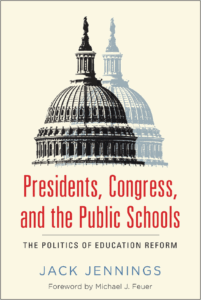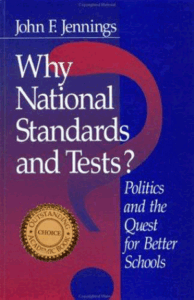His Books
Author of books on education reform, standards, and testing
Since the late 1990s, I have written about the origins of the academic standards and testing movement, its progressive transformation into the No Child Left Behind Act of 2001, and the weak reform remaining after NCLB’s demise.
Fatigued by School Reform (Rowman & Littlefield, 2020)
Politics of American Education Reform: 50-Year Struggle in Search of Equity (Tokyo University Press, 2018). Published in Japanese.
Presidents, Congress, and the Public Schools: The Politics of Education Reform (Harvard Education Press, 2015)
- Why National Standards and Tests? Politics and the Quest for Better Schools (Sage Publications, 1998)
Editor of book series on school improvement
In the 1990s, I edited National Issues in Education, a four–book series of essays published by Phi Delta Kappa, a prestigious educators’ group. The essays, written by nationally known education experts, Members of Congress from both parties, and other government leaders, addressed school improvement and better access to postsecondary education and job training.
The Past is Prologue (Phi Delta Kappa and the Institute for Educational Leadership, 1993)
Community Service and Student Loans (PDK and IEL,1994)
Goals 2000 and School to Work (PDK and IEL,1995)
Elementary and Secondary Education Act (PDK and IEL,1995)
Where to find my books
Fatigued by School Reform
After a half-a-century of school reform, a majority of Americans consider the public schools as worse today than when they attended school. Those reforms missed the mark because they were not focused on the backgrounds of the students’ parents, by far the most important indicator of students’ progress in school. The importance of parents was documented by the Coleman Report more than 50 years ago.
School reform must be continued but redirected to overcome the power of low parental socioeconomic status. The best way to improve the schools is to create a better, fairer economy providing parents with good jobs and decent wages. In the meantime, good pre-school, after-school, and other aids are needed to help students from low income families.
Teacher quality, although not as influential as the parents’ backgrounds, is the second most significant indicator of student success. Teachers, like parents, have not been the focus of the attention their importance deserves. In particular, teachers should be fairly paid, and their verbal and cognitive skills improved.
Presidents, Congress, and the Public Schools: The Politics of Education Reform
April 2015 marks the fiftieth anniversary of the Elementary and Secondary Education Act (ESEA), the landmark legislation that has provided the foundation of federal education policy in the United States. In “Presidents, Congress, and the Public Schools,” longtime policy analyst Jack Jennings examines the evolution of federal education policy and outlines a bold and controversial vision for its future.
Jennings brings an insider’s knowledge to this account, offering a vivid analysis of federal efforts in the education arena and revealing some of the factors that shaped their enactment. His rich descriptions and lively anecdotes provide pointed lessons about the partisan climate that stymies much federal policy making today. After assessing the impacts of Title I and NCLB, and exploring the variety of ways that the federal government has intervened in education, Jennings sets forth an ambitious agenda for reframing education as a federal civil right and ensuring that every child has the opportunity to learn.
Why National Standards and Tests? Politics and the Quest for Better Schools
In the 1990s, a movement to develop and implement academic standards as a way to raise American students’ level of education became a major education reform. Prior to this, states had not generally used academic standards and related tests as a way to improve elementary and secondary education.
This book is a case study of the development of this major national policy. During the 1990s, Presidents George H.W. Bush and Bill Clinton worked with Congress to eventually enact two laws requiring states to adopt their own academic standards and state-wide student testing programs. In the process, the concept of national standards and tests was jettisoned.
Politics of American Education Reform: 50-Year Struggle in Search of Equity

In November 2018, a translation in Japanese of Presidents, Congress, and the Public Schools, was released in Japan by the Tokyo University Press. The Japanese version titled, Politics of American Education Reform: 50-Year Struggle in Search of Equity, contains the text of that book with an Epilogue which brought the book up to date as of early 2018.
Three distinguished professors, Naoshi Kira, Toshiyuki Omomo, and Satoshi Takahashi, worked over a year to produce the translation. Jack Jennings contributed the updating chapter.
Comments on my books
Jack Jennings is the ultimate insider who ran the House Education and Labor Committee for many years; his perspective on congressional battles about standards and testing is hugely informative.
Diane Ravitch, an education historian
No one knows more about the Elementary and Secondary Education Act and especially Title I than Jack Jennings. (In Presidents, Congress, and the Public Schools) he tells a remarkably unbiased, informed, and crisp story about the politics, battles, and decisions made over the past fifty years. As Jennings makes clear, the story is not over. His conclusions pose a new and important course for Congress.
Marshall Smith, former under-secretary, U. S. Department of Education
Your...book is brilliant! It is clear, comprehensive, astute, and a masterpiece of brevity...Your observations are very informative and entirely consistent with those I have had since I first entered the trenches in about 1957. The lenses you used to look at this time period have clarified many things I observed and I now have a better understanding of many things that were hazy.
Chuck Quigley, founding executive director (retired), Center for Civic Education, on Fatigued by School Reform
The author is not a so-called academic researcher....but was personally involved in the legislative processes of numerous education laws....There is no doubt that this is most likely to be a must-read book...I show my respect to the translators who have selected this great book.
Akio Kitano, a professor at Nihon University, Tokyo, in 2019 wrote a review of Politics of American Education Reform for the Japanese national research journal
Why National Standards and Tests? presents an insider's view of the process by which national policy is developed. Showing considerable knowledge and expertise, Jennings provides an excellent and fair picture of the political pressures and agendas that have an impact on the development of laws.
R. Unruh, former Speaker, California Assembly
Jack Jennings, a retired policy maven who formerly served as Democrats’ top education aide in the House of Representatives, said that prize [of abolishing the Department of Education] may prove difficult to win…. “They want to get rid of the department in the long term, but the way to do that in the short term is by spinning off agencies until they don’t have anything left,” Jennings said.
In July 2024, senior reporter Kevin Mahnken of The 74 Newsletter, a web-based education publication, interviewed me extensively for an article on Project 2025, the conservative plan to reshape the country and abolish the U.S. Department of Education



